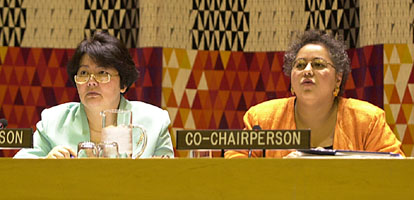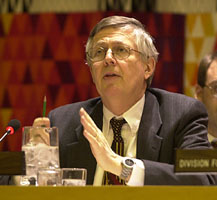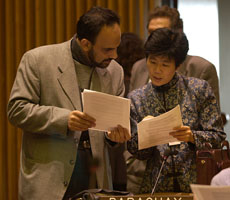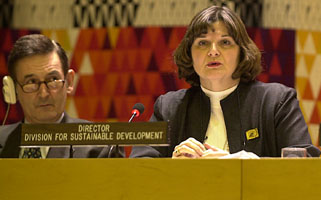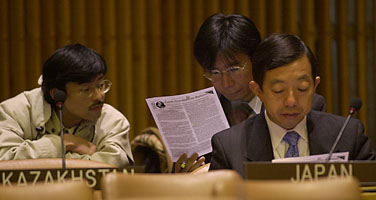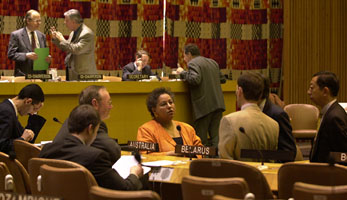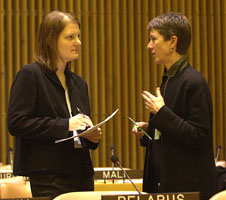| |
| In
the afternoon, Hermann Habermann, Director of the Statistics Division,
UN Department of Economic and Social Affairs, was invited to the session
to provide information and clarification regarding ECOSOC Resolution
2000/27, on basic indicators for the integrated and coordinated implementation
of follow-up to major UN conferences and summits, and the Division's
collaboration with the CSD in the development of the indicators. |
In answering
questions posed by delegates, Hermann Habermann replied
that: the Statistics Division had not disassociated itself from
environmental aspects, but rather is acting on the basis of instructions
from ECOSOC, to which it would also provide its own recommendations;
the Statistical Commission will remain the intergovernmental focal
point; the Division is working with other commissions on indicators;
the Division is a technical and not a policy body, and that its
function is to look at aspects of indicators such as, inter alia,
the extent to which they can be used in certain countries; and
the Division examines indicators at the request of the CSD, and
will go back to the CSD with its results.
See
below for RealAudio of specific questions from delegates and responses
from Hermann Habermann
|
|
 Iran,
for the G-77/China, asked why the Statistics Division
had developed indicators on the basis of socio-economic factors
and whether it had disassociated itself from environmental aspects
of indicators. He asked if the Statistical Commission would still
serve as the intergovernmental focal point for the review of indicators.
Iran,
for the G-77/China, asked why the Statistics Division
had developed indicators on the basis of socio-economic factors
and whether it had disassociated itself from environmental aspects
of indicators. He asked if the Statistical Commission would still
serve as the intergovernmental focal point for the review of indicators.
 Hermann
Habermann, Director, Statistics Division, DESA, answers
Iran's questions
Hermann
Habermann, Director, Statistics Division, DESA, answers
Iran's questions
|
|
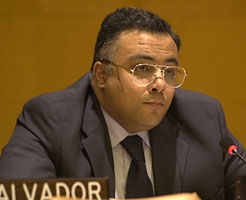 |
 Egypt
and Nigeria pose questions to the Statistics Division, Nigeria
asking about the harmonization of indicators across the UN.
Egypt
and Nigeria pose questions to the Statistics Division, Nigeria
asking about the harmonization of indicators across the UN. |
 Canada
asked
about the possibility of the statistical commission taking over
the CSD indicators exercise, and asked about distinguishing between
the role of the statistical commission and that of the CSD Secretariat
on indicators
Canada
asked
about the possibility of the statistical commission taking over
the CSD indicators exercise, and asked about distinguishing between
the role of the statistical commission and that of the CSD Secretariat
on indicators
|
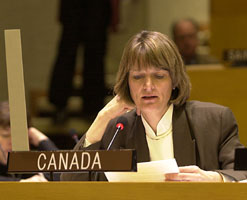 |
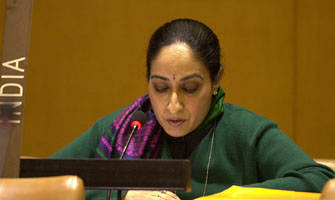 |
 India
said it was concerned that there was not a full consultation on the
process of developing the indicators with responses from the Statistics
Division and from the Division for Sustainable Development.
India
said it was concerned that there was not a full consultation on the
process of developing the indicators with responses from the Statistics
Division and from the Division for Sustainable Development. |
|
Lowell
Flanders, UN Division for Sustainable Development, during the afternoon
session
|
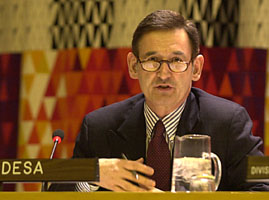 |
| Possible elements for a draft decision on Information
for Decision-makers |
 On
general considerations, Sweden, on behalf of the EU, introduced
language to: incorporate Principle 10 of Agenda 21 and references
to public participation, and environmental justice; and emphasize
developing country needs for adequate financial resources and
investment in training and capacity building. On guidance to the
multilateral system and on access to information, public participation
and access to justice, the EU added text on the feasibility and
modalities of the development of legal instruments in this area
or the addition to existing legal instruments such as the Århus
Convention, taking into account specific national socioeconomic
and cultural conditions. She also supported referring to the assessment
and evaluation of international instruments to reflect Principle
10 of the Rio Declaration.
On
general considerations, Sweden, on behalf of the EU, introduced
language to: incorporate Principle 10 of Agenda 21 and references
to public participation, and environmental justice; and emphasize
developing country needs for adequate financial resources and
investment in training and capacity building. On guidance to the
multilateral system and on access to information, public participation
and access to justice, the EU added text on the feasibility and
modalities of the development of legal instruments in this area
or the addition to existing legal instruments such as the Århus
Convention, taking into account specific national socioeconomic
and cultural conditions. She also supported referring to the assessment
and evaluation of international instruments to reflect Principle
10 of the Rio Declaration.
|
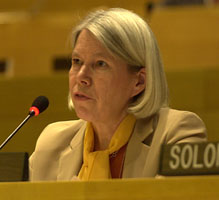 |
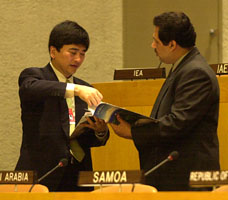 |
Saudi Arabia
and Japan
 Saudi
Arabia making general comments on the possible elements
for a draft decision on Information for Decision-making and Participation.
He said the text was agenda driven, was difficult to accept and
focused too much on indicators. He noted that although delegates
had not raised the issue of providing assistance, it was in the
text.
Saudi
Arabia making general comments on the possible elements
for a draft decision on Information for Decision-making and Participation.
He said the text was agenda driven, was difficult to accept and
focused too much on indicators. He noted that although delegates
had not raised the issue of providing assistance, it was in the
text.
|
 Nigeria
said the document emphasizes indicators, instead of dealing with
information for decision making, and recalled that concerns had
been raised on the UN Economic and Social Council's (ECOSOC) decision
on the participation of all countries in the development of indicators
and the Statistical Commission's work in this area.
Nigeria
said the document emphasizes indicators, instead of dealing with
information for decision making, and recalled that concerns had
been raised on the UN Economic and Social Council's (ECOSOC) decision
on the participation of all countries in the development of indicators
and the Statistical Commission's work in this area.
|
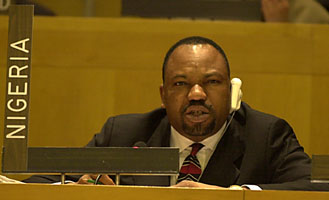 |
|
|
Everyone
is reading the daily ENB. . . . |
|
China
and Brazil
On
the CO-Chairs document, the G-77/China expressed concern
with the structure, methodology and substance of the draft, adding
that the content should reflect Rio+5 language on the measurements
for implementation, the role of information in development and an
acknowledgment of the necessity of combining socioeconomic aspects
in the analysis of data produced through new technology.
|
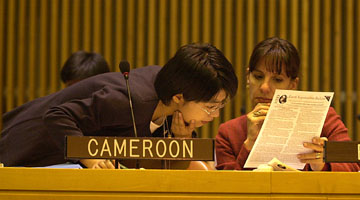 |
| On general considerations,
the G-77/China said the section should focus on information
for decision making and participation. He suggested deleting references
to international standards and to greater partnership between developed
and developing countries, and adding references that emphasize technology
transfer and infrastructural needs in developing countries. |
|
|
Co-Chair
Alison Drayton consulting with delegates before the morning session
convenes
|
|
On
recommendations for activities at the national level, Canada
proposed language: emphasizing free and open access to information,
while observing confidentiality of sensitive data; distinguishing
between specialized information that can be privatized and information
available to the public; providing for partnerships with NGOs and
private sector organizations in developing strategies on data collection
methods; and encouraging the appreciation of traditional and community
knowledge.
|
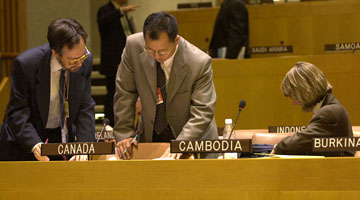 |
|
|
ENB writer
Wendy Jackson speaks with Tricia Kaye, Australia
On recommendations
for activities at the national level, Australia proposed text
to cover: traditional and indigenous knowledge; private, as well
as commercialized, information; and references to women and aged
people.
|
|
RELATED
LINKS
Past
IISD Coverage:
|
|


